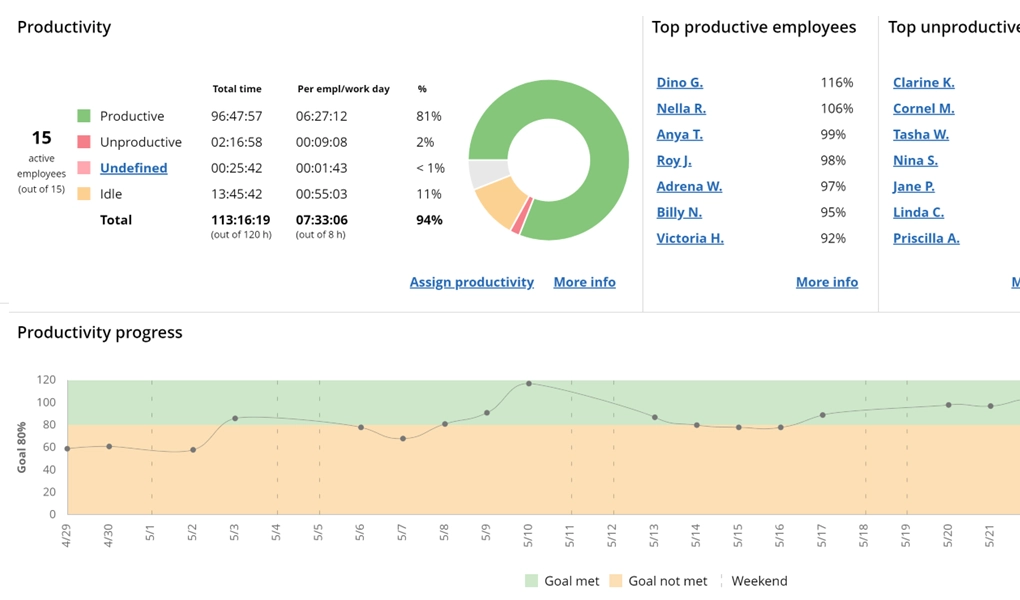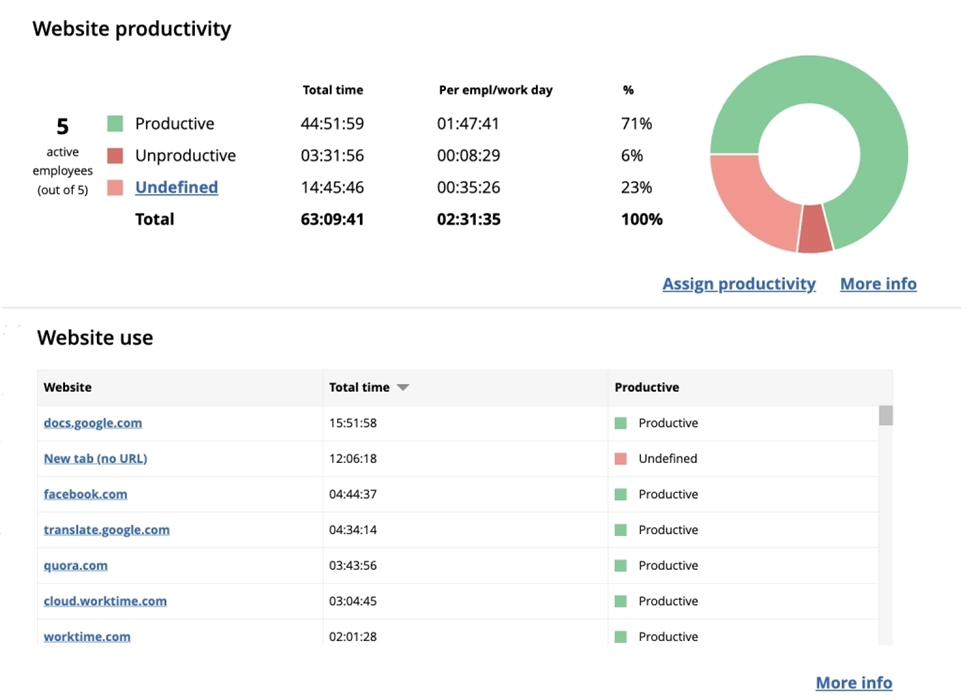Top 5 concerns your employees worry about
WorkTime answered the most common questions related to the legal side of employee monitoring, and this is what troubles your employees the most.Can my employer track me without telling me?
This question is in the top spot. Generally, monitoring employees without their knowledge is legal in several countries. We delve into this issue further in this article, so you can learn more about legislative approaches toward employer rights in the US, EU, UK, South Africa, and Australia.Are cameras allowed in employee break rooms?
If an employer is determined to use employee monitoring software to keep tabs on what they do during the working day, this is legal. However, it is illegal to mount surveillance tools in areas exclusively for privacy, such as cafeterias, locker rooms, or bathrooms, where people can talk about their personal issues. Employers who violate these regulations could be sued and penalized.Can employers listen to employee conversations?
It depends on specific circumstances and the legislation of a certain country.Generally, monitoring private communication or phone conversations outside the workplace is prohibited. But if we talk about work-related areas, it depends on the employee monitoring laws by state. In the US, the ECPA protects employees' workplace privacy, prohibiting the premeditated interception of oral, wire, and electronic communication by employees. Several exceptions also apply, although exceptions apply to employers:
- “Business Motive Exception,” which permits employers to monitor employees at work through oral and electronic communications if it has been done for legitimate business reasons.
- “Approval Exception,” which allows employers to monitor employees' communications/activities via monitoring apps and other means.
- Business-related issues;
- Detection and prevention of criminal activity;
- Security purposes;
- Identifying the unauthorized use of the company’s devices;
- Ensuring the workers adhere to the company’s standards.
Can an employer watch you on camera from home?
If you work remotely for a certain reason, the employer has the same right to monitor your activity and gather data from your keyboard and webcam during work hours.Can your employer spy on you at home?
No. The employer has no right to monitor workers through a web camera outside work hours. Besides, it will be regarded as a violation of employees’ privacy and an invasion of personal space. But when it comes to working from home via company’s devices, monitoring is not regarded as spying.Legal or not, put your employees first
“Take care of the people, the products, and the profits - that order.” Ben Horowitz, American businessman, investor, the author of “The Hard Thing About Hard Things”
“Putting people first is going to lead to outstanding customer satisfaction and financial performance." Michael C. Bush, CEO, Great Place To Work
“Clients do not come first. Employees come first. If you take care of your employees, they will take care of the clients.” Richard Branson, CEO and founder of Virgin Group
“Our mission statement about treating people with respect and dignity is not just words but a creed we live by every day. You can’t expect your employees to exceed the expectations of your customers if you don’t exceed the employees’ expectations of management.” Howard Schultz, former CEO and chairman of Starbucks Coffee
In the endless race for big checks and new customers, business owners often forget about building and maintaining favorable work conditions. The employer-employee relationship is a fundamental component of an effective business strategy and, as a result, success. Of course, the law is often on the side of employers, giving them the green light to monitor their employees without their knowledge for the sake of their company’s purposes. But if you are planning to build a solid background for your business growth, then a choice in favor of transparent relations with your employees is a winning long-run tactic.“Understanding your employee’s perspective can go a long way towards increasing productivity and happiness.” Kathryn Minshew, CEO and co-founder of The Muse
We are WorkTime, a software company with 20+ years of expertise. Our non-invasive employee monitoring and productivity tracking help to create a respectful work environment.
Go non-invasive - announce monitoring easily
WorkTime offers green employee monitoring. It complies with the strictest legal requirements, including GDPR and HIPAA. Our non-invasive, socially responsible, effective, and safe monitoring technology is perfect for building a transparent and positive workplace for your employees. Monitor employee productivity with respect to their privacy and get 50+ non-invasive reports.
Discover how WorkTime can support your team!
Request a personalized demo - we’re here to answer all your questions!
Book demo
The Screen Productivity Report from WorkTime is a safe alternative to invasive screenshot methods. Instead of capturing screen content, it provides an analysis of employee screens in numerical form
Start free trialBonus overview: exploring monitoring laws
USA: notifying employees depends on the state
Under US federal laws, employer rights include monitoring their employees as they perform their duties. However, Lewis Maltby, President of the National Workrights Institute, confirms that the location where employees are being monitored matters.US federal law allows employers to monitor their employees as they perform their duties.One of the most frequent forum questions related to privacy laws in the workplace is “Can my employer track me without telling me?” According to federal legislation, the employer doesn't need to inform the employees about monitoring. Only in four states, including Connecticut, Delaware, Texas, and New York, the employer is required to notify the staff about implementing monitoring software.
Employee monitoring laws in the US permit employers to monitor workers without their consent in the majority of states.In 2026, U.S. employers increasingly choose to notify employees even in states where it is not legally required, as lawsuits and internal disputes often hinge on transparency rather than legality alone.
UK: announcement is required (with some exceptions)
Is it legal to monitor employees without their knowledge? UK legislation states that the employer must announce implementing monitoring software in most cases. Still, several exceptions allow the monitoring of employees without their knowledge:- Suspicion of criminal activity;
- Covert monitoring for specific investigation aims.
Monitoring without informing the staff must be stopped right after the issue is investigated.In 2026, UK regulators pay closer attention to whether monitoring is necessary and proportionate, not just whether employees were informed.
European Union: informed monitoring only
Is it legal to monitor employees without their knowledge in the EU? According to EU employee monitoring laws, employers are expected to inform their staff about the use of monitoring systems. Emails, keystrokes, and screen content can only be tracked when a documented agreement has been reached (monitoring policies and handbooks).The European Court of Human Rights decided that employers must notify employees regarding any monitoring activity they intend to undertake.In 2026, GDPR enforcement increasingly penalizes excessive monitoring, even when employees have been formally notified.
Australia: informing is a must
Is it legal to monitor employees without their knowledge in Australia? Australian employee monitoring laws require employers to inform the workers that they are monitored. Furthermore, the authority should discuss the time frame, including the exact time when the workplace surveillance will start and the nature of the monitoring. In Australia, only a few states have workplace privacy laws. For example, The Workplace Monitoring Act of 2005 (NSW) s10, s12 stipulates that employers may monitor their employees’ computer use only if a monitoring policy is available and the employees are notified that their computer activities are being monitored. In 2026, Australian employers are expected to provide clearer written policies outlining monitoring scope, especially for hybrid and remote workers.South Africa: notifying is not obligatory
Is it legal to monitor employees without their knowledge? In most cases, South African legislation permits monitoring staff without notifying them. But if the employer uses invasive monitoring software, then it is obligatory to inform employees. These cases involve:- Monitoring personal email;
- Recording any content or Internet usage on personal devices;
- Keylogging;
- Phone call interception.
Implementing non-invasive software allows employees not to announce monitoring in South Africa.WorkTime employee monitoring and productivity tracking will be an effective solution to maintain a healthy balance between business interests and the employees' privacy. Monitor your employees and get reports in numbers, without any invasive content capturing.

What’s the final verdict?
Is it legal to track employees without their knowledge? There should be a healthy balance between the business interests and employees’ privacy. Maintaining a respectful and loyal work environment is much more effective than invasive monitoring methods.With WorkTime, employees’ questions like “How to tell if employer is monitoring computer?” won’t be a thorny issue for you anymore. You will successfully build transparent employer-employee relationships and stay confident in your team’s productivity. Try 14 days for free and boost your team productivity with non-invasive employee monitoring!Invasive, disrespectful tools are out-of-date. Go green with WorkTime and build a progressive, loyal, and effective work environment!









